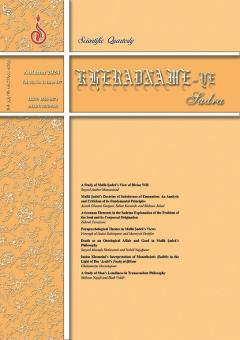A Study of Man’s Loneliness in Transcendent Philosophy
Subject Areas : ملاصدراپژوهی و اندیشۀ حکمت متعالیه
Mehran Najafi
1
![]() ,
Hadi Vakili
2
,
Hadi Vakili
2
1 - PhD Candidate of Transcendent Philosophy, Research Institute for Humanities and Cultural Studies, Tehran, Iran
2 - Associate Professor, Research Institute for Humanities and Cultural Studies, Tehran, Iran
Keywords: Loneliness, copulative existence, cognitive psychotherapy, psychology, Islamic philosophy, Transcendent Philosophy,
Abstract :
Loneliness is not considered an illness by itself; however, it could be the origin of some physical and psychological diseases. In this paper, the authors introduce the different types of loneliness and investigate its physical and spiritual effects. Next, they explain Mullā Ṣadrā’s doctrine of the relationship between God and Man. Based on the principles of the Transcendent Philosophy, Man is closely related to God and desperately needs Him, and no separation between Man and God is imaginable. In such an atmosphere, the problem of loneliness is basically annulled. In other words, the feeling of loneliness is rooted in the ignorance of the structure of being. Thus, the removal of this ignorance, can lead to the removal of the feeling of loneliness and its negative effects. Such an approach is closely related to cognitive psychotherapy, based on which human feelings and emotions are not solely the product of people’s direct encounter with the external world. Rather, their interpretation of this world and the way they approach it play important roles in the formation of their feelings and emotions. Clearly, a change in an individual’s interpretations and views can lead to changes in their feelings and thoughts. Similarly, any change in one’s worldview can lead to a change in their analysis of their living conditions and place in the world of being. An individual who develops their worldview based on the Transcendent Philosophy will never feel separation from the world of being. Hence, they will never suffer from loneliness.
